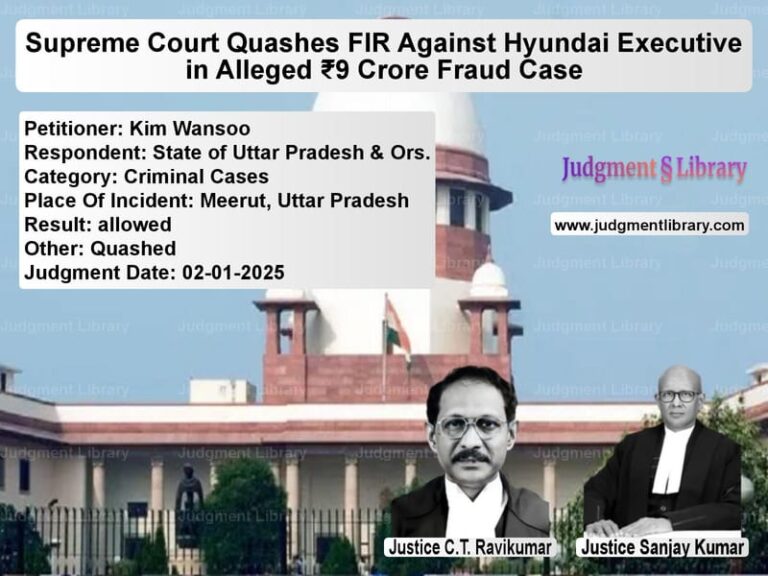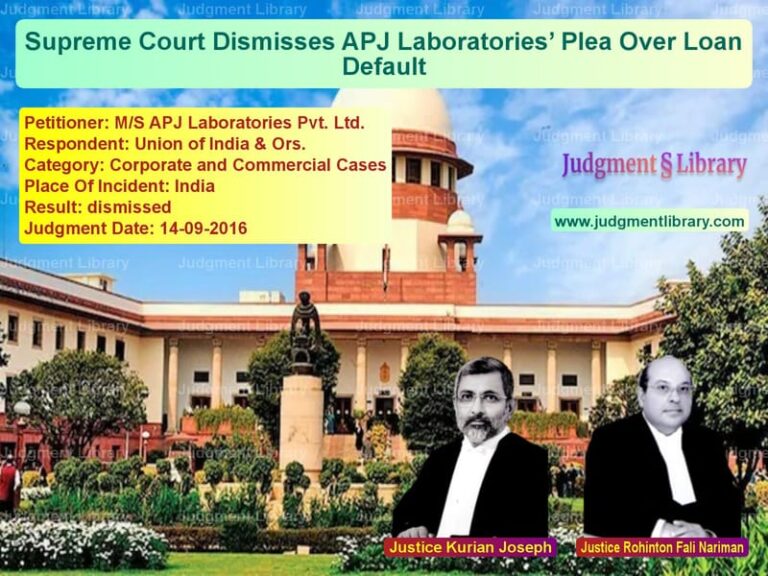Constitutional Challenge to Jammu & Kashmir Reservation Act: A Case Study of Munilal & Ors. v. State of Jammu and Kashmir
The case of Munilal & Ors. v. State of Jammu and Kashmir concerns a petition filed under Article 32 of the Constitution of India, challenging the constitutional validity of certain provisions of the Jammu & Kashmir Reservation Act, 2005. The petitioners sought to have specific provisions of the Act and the corresponding rules declared illegal and unconstitutional. The matter had been pending in the Supreme Court for over 16 years before it was disposed of on 28th September 2022. The Supreme Court’s order allowed the petitioners to withdraw the petition with liberty to take appropriate legal action. This case highlights the significance of judicial review in examining the validity of state laws and the impact of constitutional challenges on legislative actions.
Background of the Case
The petitioners, Munilal and others, filed the writ petition challenging certain provisions of the Jammu & Kashmir Reservation Act, 2005, which regulated reservations in educational institutions, government jobs, and other benefits within the state. The petitioners argued that the provisions were unconstitutional and discriminatory in nature, violating the principles of equality enshrined in Article 14 of the Constitution of India. The petition was filed in 2006, and it had remained pending for over a decade. During this period, the Reservation Act was amended, and the provisions challenged in the petition underwent several modifications. Despite these developments, the petitioners continued with their legal challenge. Eventually, the case reached the Supreme Court, which allowed the petitioners to withdraw the petition with liberty to initiate further proceedings as per the law.
Read also: https://judgmentlibrary.com/supreme-court-rules-on-speakers-power-in-disqualification-cases/
Petitioner’s Arguments
The petitioners raised several arguments against the provisions of the Jammu & Kashmir Reservation Act, 2005:
- Violation of Equality Rights: The petitioners argued that the Reservation Act violated the right to equality guaranteed under Article 14 of the Constitution. They claimed that certain provisions of the Act created unjustifiable classifications that discriminated against specific sections of society, leading to unequal treatment in the allocation of opportunities for education, employment, and government benefits.
- Excessive Reservations: The petitioners contended that the provisions of the Act led to an excessive allocation of reservations, which they argued was not justified by the social and educational backwardness of the identified groups. They claimed that excessive reservations adversely affected the merit-based selection process and led to inefficiencies in the functioning of government institutions.
- Inadequate Representation of Certain Groups: The petitioners also pointed out that the Act failed to provide adequate representation to other marginalized groups in the state, such as economically disadvantaged individuals from higher castes. They argued that the existing provisions disproportionately favored certain groups while neglecting the needs of others who were equally deserving of affirmative action.
- Lack of Constitutional Safeguards: The petitioners emphasized that the Act lacked the necessary constitutional safeguards to ensure that the benefits of reservations reached the intended beneficiaries. They argued that the absence of a rigorous mechanism for identifying backward classes and monitoring the impact of reservations undermined the effectiveness of the legislation.
Respondent’s Arguments
The respondent, the State of Jammu and Kashmir, defended the provisions of the Reservation Act, asserting the following points:
- Constitutionality of the Act: The respondent argued that the Jammu & Kashmir Reservation Act, 2005, was constitutionally valid and in line with the provisions of the Constitution. The respondent emphasized that the Act was enacted by the state legislature in exercise of its powers under Article 15(4) and 16(4) of the Constitution, which allow for reservations for socially and educationally backward classes.
- Affirmative Action for Backward Classes: The respondent claimed that the Act was a necessary measure to promote social justice and provide opportunities to historically marginalized communities. They argued that the reservation provisions were aimed at uplifting the backward classes and ensuring their equitable participation in education, employment, and governance.
- State Autonomy and Legislative Competence: The respondent emphasized the special status of Jammu & Kashmir under Article 370 of the Constitution. They argued that the state had the autonomy to legislate on matters concerning reservations, and the provisions of the Reservation Act were within the state’s legislative competence. The respondent further pointed out that the Act had been amended to address the concerns raised by the petitioners, rendering their challenge irrelevant.
- Proportionality of Reservations: The respondent argued that the proportion of reservations provided under the Act was reasonable and justified by the socio-economic conditions of the state. They maintained that the reservations were not excessive but rather a necessary step towards rectifying historical inequalities.
The Court’s Reasoning
The Supreme Court, after reviewing the case and considering the arguments from both sides, made the following observations:
- Review of the Reservation Act: The Court acknowledged the long-standing debate surrounding the constitutional validity of reservations. While the Court recognized the importance of affirmative action for disadvantaged groups, it also noted that such measures must be reasonable and justifiable. The Court emphasized that any provision of reservation should be proportionate to the extent of the social and educational backwardness of the intended beneficiaries.
- Right to Equality and Reservation: The Court reiterated the principle that the right to equality is not absolute and can be subject to reasonable restrictions in the interest of promoting social justice. The Court pointed out that reservations were intended to uplift socially and educationally backward classes, and this policy was consistent with the constitutional mandate of securing equality for all citizens.
- Amendments to the Reservation Act: The Court noted that the Reservation Act had undergone several amendments during the pendency of the petition, which addressed some of the concerns raised by the petitioners. The Court took into account the changes made to the Act and observed that these amendments had brought the Act closer in line with constitutional provisions, thus reducing the need for judicial intervention.
- Withdrawal of the Petition: The Court observed that the petitioners had sought to withdraw the writ petition, with the liberty to initiate appropriate proceedings in the future. The Court agreed to the withdrawal of the petition but allowed the petitioners the opportunity to challenge any future actions that they deemed unconstitutional.
The Court’s Decision
The Supreme Court made the following orders:
- Dismissal of the Petition: The Court dismissed the petition filed by the petitioners, allowing them to withdraw it with liberty to initiate further legal proceedings if necessary. The Court noted that the amendments to the Reservation Act had addressed the concerns raised by the petitioners.
- Liberty to Take Further Action: The Court granted the petitioners liberty to take or initiate any appropriate proceedings in accordance with the law. The petitioners were free to challenge any future provisions or actions of the government related to reservations that they believed violated constitutional principles.
- No Costs: The Court made no order as to costs, recognizing the constitutional nature of the case and the fact that the matter had been pending for a long period.
Conclusion
This case reflects the challenges in balancing the right to equality with the need for affirmative action in the form of reservations. The Supreme Court’s decision underscores the importance of judicial review in ensuring that such laws do not violate constitutional principles while also recognizing the need for social justice for historically marginalized communities. The ruling also highlights the evolving nature of legislation on reservations, with courts carefully scrutinizing the legislative process and ensuring that any measures taken are in line with the constitutional mandate of equality and fairness.
Petitioner Name: Munilal & Ors..Respondent Name: State of Jammu and Kashmir & Anr..Judgment By: Justice Uday Umesh Lalit, Justice S. Ravindra Bhat, Justice J.B. Pardiwala.Place Of Incident: Jammu and Kashmir.Judgment Date: 28-09-2022.
Don’t miss out on the full details! Download the complete judgment in PDF format below and gain valuable insights instantly!
Download Judgment: munilal-&-ors.-vs-state-of-jammu-and-k-supreme-court-of-india-judgment-dated-28-09-2022.pdf
Directly Download Judgment: Directly download this Judgment
See all petitions in Fundamental Rights
See all petitions in Constitution Interpretation
See all petitions in Legislative Powers
See all petitions in Public Interest Litigation
See all petitions in Judgment by Uday Umesh Lalit
See all petitions in Judgment by S Ravindra Bhat
See all petitions in Judgment by J.B. Pardiwala
See all petitions in dismissed
See all petitions in supreme court of India judgments September 2022
See all petitions in 2022 judgments
See all posts in Constitutional Cases Category
See all allowed petitions in Constitutional Cases Category
See all Dismissed petitions in Constitutional Cases Category
See all partially allowed petitions in Constitutional Cases Category







